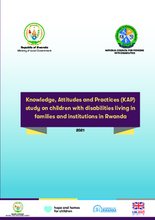Background
The rights of persons with disabilities, to live in a family within their communities and be given equal opportunities and freedom of choice alike other citizens, is at the heart of the Convention on the Rights of Persons with Disabilities (CRPD). However, this can only be achieved if states invest in ensuring that citizens with disabilities have access to inhome and community-based provisions from the early stages of their lives (Márton et al., 2013).
Like all signatory states, Rwanda is fully committed to the rights of children with disabilities and other special educational needs, including their inclusion in neighbourhood schools and rights in families and communities (Republic of Rwanda 2013, NCC 2012). However, despite existing policies and legislations geared toward these commitments, reports continue to highlight challenges hindering children with disabilities’ access to their rights in many countries, including Rwanda (UNICEF, 2018). For this reason, Hope and Home for Children, in collaboration with UK Aid Match, the National Council of Persons with Disabilities (NCPD) and the National Commission for Children (NCC), now NCDA, have jointly been investing in supporting the national integration program of children with disabilities in families and preventing their separation.
This study is part of the response to the global call for the provision of quality alternative family-based care and prevention of family separation for children with disabilities. The study is premised on the view that the knowledge, attitudes, and practices regarding the attributes assigned to, and the conceptualization of, children with disabilities in their families and communities, vis-à-vis institutional care for children with disabilities, are also crucial determinants of barriers/ enablers of full and meaningful integration of children with disabilities into community life in Rwanda.
To achieve this objective, a cross-sectional analytical design using both quantitative and qualitative approaches was conducted between October and November 2020. A survey questionnaire (quantitative data) was filled out by parents and caregivers of children with disabilities to evaluate their Knowledge, Attitudes, and Practices (KAP) regarding children with disabilities and deinstitutionalization. To understand parents’ experiences, a subsample of parents and caregivers participated in focus group discussions. In addition, qualitative interviews were undertaken with leaders of residential institutions for children with disabilities, local professionals (social workers and psychologists), and community leaders involved in the gatekeeping of children with disabilities.
A total of 807 caregivers/parents of children with disabilities completed the questionnaire, 17 parents/caregivers attended the focus group discussions, and ten professionals working with children with disabilities were individually interviewed.
Related:

